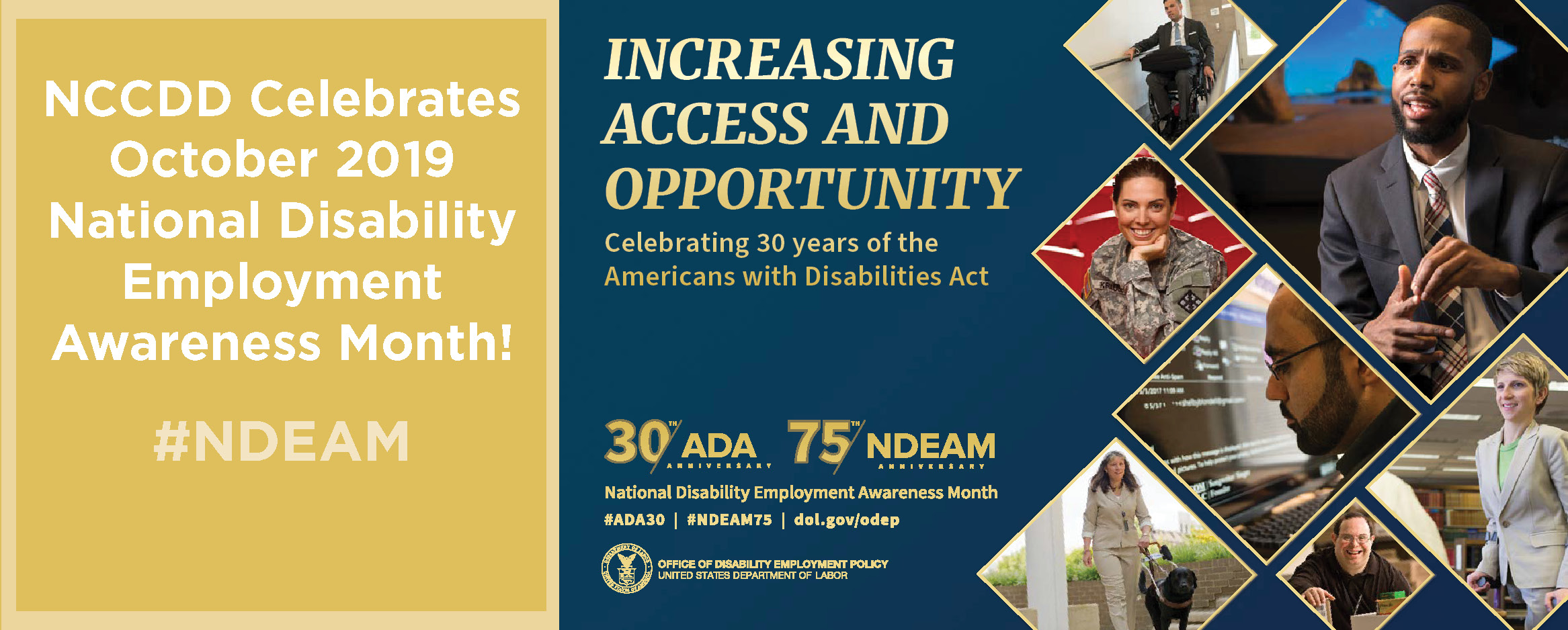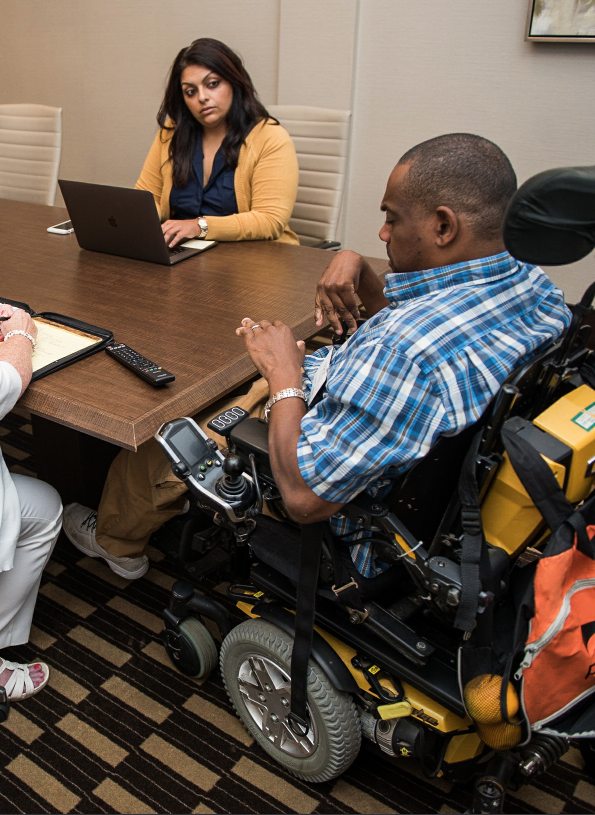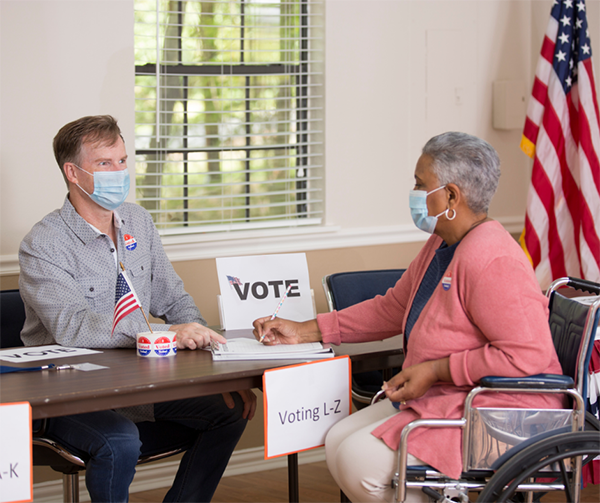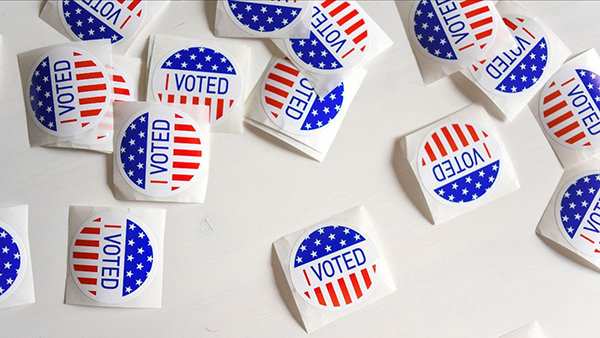October 2020 - Highlights and Hot Topics

Letter from the Executive Director
My friend Francel, who has an intellectual disability, loves his job in the cardiac unit at a university hospital. His team loves and values him. His job is critical for his income, his independence and his connection to others. His co-workers and supervisors say he is one of their best employees. He adds tremendous value to a unit that saves lives every day.
Another friend of mine, Chris, who has cerebral palsy, told me recently over coffee that we need to flip the traditional thinking about people with disabilities and employment. Some employers undervalue people with disabilities when hiring. That is wrong. They are often the most valued employees in their work. The data backs Chris up. A 2018 Report by Accenture, the national consulting company, found that companies that championed disability employment inclusion outperformed others in both profitability and value creation.

October is Disability Employment Awareness Month, but these efforts are supported and worked on year-round.
At the Council, we held listening sessions with self-advocates, family members and stakeholders in the disability community across North Carolina. One of the consistent messages we heard is the need to increase employment in competitive wage jobs for people with disabilities. This is now more important than ever due to the impact of COVID-19 on employment.
The Council will build on our systems change work to increase employment for people with disabilities in our state.
You can read some fantastic stories and see pictures of people with disabilities working across North Carolina in our NCCDD Lookbook. Also, read an interview of my terrific predecessor, Chris Egan, on disability employment later in this newsletter.
So, for National Disability Employment Awareness Month, spread the message that our small businesses and large companies across the state need to substantially hire more people with disabilities. This will not just benefit the disability community, it will benefit our businesses, communities and our entire state.
Talley Wells, Executive Director
Public Policy Update as of October 18

STATE UPDATE
NC General Assembly
The North Carolina General Assembly (NCGA) returned to Raleigh for a two-day mini-session back in September to allocate federal Coronavirus dollars. Besides some committee meetings, there has been little activity at the NCGA due to election season. The one thing that could bring them back is if additional federal funds would need to be allocated. However as you will see in the Federal update section, this is unlikely.
The long session of the NCGA will begin on January 13, 2021. This session will include passing a two-year budget. There are many factors that will affect this budget:
- NC revenue is down due to COVID
- There is uncertainty about another federal stimulus package, and
- The elections will likely change the faces at the legislature.
The Council’s policy committee is actively following these factors and will continue to seek input as we develop policy priorities for the next year.
Policy
North Carolina has used the ‘Appendix K’ to request and receive permission from the Centers for Medicare and Medicaid Services to offer more flexibilities for the NC Innovations waiver. These have been helpful for individuals and families during the pandemic. Recently, the issue of use of Innovations services during school hours arose as children often were experiencing reduced hours of instruction through virtual/remote schooling. The Council joined with other groups to provide feedback to NC Medicaid and the Department of Public Instruction (DPI) about the challenges that many families were facing. NC Medicaid was able to secure additional flexibilities through the Appendix K to help resolve this issue.
“Respite may be utilized during school hours for sickness, injury, when a student is suspended or expelled, or school hours during the public health emergency that necessitates remote learning.”
Medicaid Transformation
DHHS has resumed implementation of managed care and is planning to launch the Standard Plan on July 1, 2021. Until that time, beneficiaries will continue to receive care through the current fee-for-service model. As a reminder, Standard Plans will launch first and serve the majority of Medicaid and NC Health Choice beneficiaries enrolling in Medicaid managed care. Behavioral Health I/DD Tailored Plans will serve populations with more significant behavioral health conditions, intellectual or other developmental disabilities (I/DD) and traumatic brain injury (TBI). The launch of the Tailored Plan will be one year after implementation of the Standard Plans.
 Voting
Voting
The November elections are fast approaching. Some key dates to keep in mind:
- Oct 27 – Last day to request absentee ballot. (Do this as soon as possible because Absentee Ballots have to be postmarked by Election Day at 5 pm AND received by Nov 6th in order to be counted)
- Oct 31 - Early Voting ends
- Nov 3 – Election Day
Multi Partisan Assistance teams (MAT) are available in each county to provide assistance with mail-in absentee voting and other services to voters living in facilities and voters with disabilities. Contact your county board of elections to request MAT assistance. They can provide the following help.
- Providing voter registration services
- Requesting an absentee ballot
- Serving as an absentee witness
- Marking the absentee ballot
- Sealing the ballot and completing the absentee application
- Mailing the voted absentee ballot in the closest U.S. mail depository or mailbox, if the voter has a disability
For a complete guide to voting, visit Help for Voters with Disabilities or Access the Vote NC - Access the Vote NC - Accessible Voting - DRNC
FEDERAL UPDATE
In our last Highlights & Hot Topics (HHT), it was noted that the continued partisan disagreement over the scope of relief needed to address COVID-19 would make it unlikely that a standalone COVID-19 relief package will pass before the November election. As you recall, the House passed the HEROES Act in May, and later the HEROES Act 2.0 which was a less robust version of the bill. Both of these included items that would help people with I/DD including Medicaid funding and funding for home and community-based services (HCBS). The second HEROES Act was proposed in an effort to re-start discussion and negotiations between the House and Senate. Recently, Republican leadership proposed a smaller package which could possibly come up in the Senate in the coming days. Yet it is unclear if the Senate will consider this bill at all. In addition to the basic disagreements about a package, the confirmation hearings also interrupted talks about the fourth stimulus package making it even more difficult to come to an agreement.
The confirmation hearings for Amy Coney Barrett, the nominee to replace the late Supreme Court Justice Ruth Bader Ginsberg, has taken over Congress’ activity over the last few days. She seems to have a clear path to being confirmed. Concerns have been raised about Judge Barrett’s record on issues that impact the disability community, including the Affordable Care Act (ACA). The ‘pre-existing conditions’ aspect of the ACA is at risk of being overturned with a case coming before the Supreme Court this fall. Judge Barrett is expected to be confirmed prior to the November election.
COVID-19’s Impact on Employment of People with Disabilities in North Carolina
 Chris Egan, Senior Director, North Carolina Department of Health and Human Services, sat down with us to discuss North Carolina’s employment for people with disabilities and the impact that COVID-19 is having on jobs.
Chris Egan, Senior Director, North Carolina Department of Health and Human Services, sat down with us to discuss North Carolina’s employment for people with disabilities and the impact that COVID-19 is having on jobs.
NCCDD: What is the state of employment for people with disabilities during this time of COVID-19?
CHRIS EGAN: As we have all experienced, the onset of COVID-19 resulted in the need to implement a series of important protections for all citizens by promoting use of face coverings over the mouth and nose (Wear), distancing from each other by at least six feet (Wait) and frequent washing of hands for at least 20 seconds (Wash). Safely preventing the spread of this virus also meant the need for businesses to implement difficult but important steps to reduce the number of customers and employees in the same space for extended periods of time leading to furloughs and layoffs.
To put it in perspective, last February 2020, North Carolina had been holding steady with a low overall unemployment rate of under four percent and this was a positive factor in our efforts to promote employment for people with disabilities. Low unemployment has created more opportunity for people with disabilities to find and secure competitive, integrated employment and we are seeing the business community become more and more open and interested in the benefits of diversifying the workforce. As occurred across the nation, because of COVID the rate of unemployment rose and peaked nationwide at over 14 percent and North Carolina remained just lower at 12.9 percent. Since the peak in April and May there has been a steady decline in the rate of unemployment with the August seasonally adjusted rate hovering at 6.5 percent (nearly two points better than the nationwide average).

To the question on employment among people with disabilities, even under the best of times the rate of employment is much lower. For example, according to the Current Population Study (CPS), in 2019, only about a third of people with a disability, ages 16-64, were participating in the labor force, and among those in the job market the unemployment rate was eight percent. Comparatively, for people without a disability in the same age group, better than three of four were participating in the labor force and the unemployment rate was less than four percent.
In times of high unemployment, such as with COVID-19, the employment gap for people with a disability widens. The September 2020 CPS shows that, although labor force participation was about the same as it was the prior year, the unemployment rate among those ages 16-64 had increased to 13.4 percent for people with disabilities and 7.5 percent for those without.
Continue reading the interview here.
Disability Rights NC Releases Election Guide for Voters with Disabilities
 One in four people eligible to vote has a disability according to Disability Rights North Carolina (DRNC). The organization notes that if people with disabilities voted at the same rate as people without, there would be 2.35 million more voters.
One in four people eligible to vote has a disability according to Disability Rights North Carolina (DRNC). The organization notes that if people with disabilities voted at the same rate as people without, there would be 2.35 million more voters.
When you vote, you help choose who will oversee your country, state and your city. Voting is how to make sure that the people in office support the rights and well-being of people with disabilities. With the election just a few days away, here is what you need to know as you make your plan to vote.
According to DRNC, the top five issues facing people with disabilities as they vote are:
- Voters who live in facilities face strict limitations on who may provide necessary assistance to cast an absentee ballot. But there are resources to help. Learn more here.
- Having a Guardian doesn’t mean that you can’t vote. Voters with a guardian may vote without the consent or assistance of their Guardian if they want.
- No one is entitled to tell you who to vote for.
- If you are voting in person you can ask anyone to help you if you need help casting your ballot. You can bring someone with you or even ask a poll worker to help you.
- If you vote in person and don’t want someone to help you, you can ask to use an accessible machine. Every poll site should have a machine available that makes voting more accessible for people with visual, literacy and dexterity related needs.
At each election, according to DRNC, there are problems at poll sites that keep people with disabilities from being able to vote. Here are some common issues:
- Voters are unable to use the assistive technology that is present because poll workers either do not know how to work it or haven’t turned it on and prepared it for use.
- Poll workers believe that a voter with disabilities is being exploited and assume because of the severity of their disability they do not have the capacity to vote.
- Poll workers do not allow a person to vote based on assumptions about their disability.
- Poll workers ask people with disabilities to prove they have the capacity to vote, including asking them to demonstrate they can read and write.
 What do you do if you encounter any of the above issues? Here are some tips:
What do you do if you encounter any of the above issues? Here are some tips:
- If you have a problem voting in person, ask to speak with the chief judge on site. That person has the authority to grant you whatever accommodation you need.
- If the chief judge doesn't agree to your request contact your County Board of Elections, the State Board of Elections, and Disability Rights North Carolina or call their voter hotline at 1-888-WEVOTE2.
- Vote early! That way if you run into any trouble you will have a chance to get it resolved in time for your vote to count.
Check out DRNC’s voting guide for the 2020 election.
Disability Rights North Carolina is a legal advocacy agency that fights for the rights of people with disabilities in North Carolina. Remember to keep their voter hotline phone number handy: 1-888-WEVOTE2. For additional information on your voting rights, please go to www.accessthevotenc.org.

